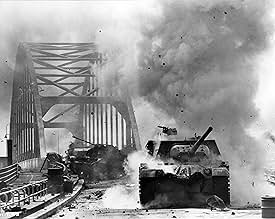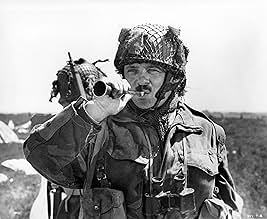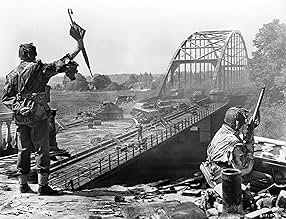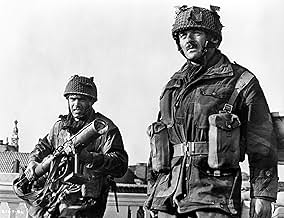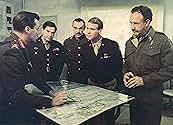अपनी भाषा में प्लॉट जोड़ेंOperation Market Garden, September 1944: The Allies attempt to capture several strategically important bridges in the Netherlands in the hope of breaking the German lines.Operation Market Garden, September 1944: The Allies attempt to capture several strategically important bridges in the Netherlands in the hope of breaking the German lines.Operation Market Garden, September 1944: The Allies attempt to capture several strategically important bridges in the Netherlands in the hope of breaking the German lines.
- निर्देशक
- लेखक
- स्टार
- 4 BAFTA अवार्ड जीते गए
- 7 जीत और कुल 5 नामांकन
- Underground Leader's Wife
- (as Marlies Van Alcmaer)
- Underground Leader's Son
- (as Eric Van't Wout)
- Gen. Blumentritt
- (as Hans Von Borsody)
फ़ीचर्ड समीक्षाएं
Other memorable events were the air droppings on the Ginkelse Heide (heath), and the ceremony at the military cemetery at Oosterbeek, attended by the Queen of Holland and the Prince of Wales.
For those who are interested, here are some good websites with info on the battle:
http://www.marketgarden.com
http://members.lycos.nl/marketgarden44
http://www.bbc.co.uk/history/war/wwtwo/battle_arnhem_01.shtml
http://www.rememberseptember44.com
Hope someone found this useful. Hans, from Holland.
It helps that the ensemble cast is great - perhaps the best ever assembled - and the characterization, though a bit thin (as in most war movies), is certainly good enough considering how heavily the plot dominates. The film's one major weakness is that it telegraphs the battle's result from too early on; all the smart characters think that the operation will be a disaster, and lo and behold, it's a disaster.
I love this movie anyway, maybe because of the production style, which is more realistic than the cornball war films of previous decades but not quite so over-the-top as "Private Ryan." The battles are both thrilling and terrifying, a nicely struck balance. When the end credits roll, I always feel tired - like the characters - which is a testament to how involving (and effective) the movie is.
In 1944, the German armies were being pushed back across the Low Countries. The Allies' great strategic problem was the Rhine, the wide river which formed Germany's western border. A daring plan was conceived which would overcome the Rhine obstacle and open the road to Berlin. 'Market Garden', as the plan was codenamed, involved parachuting spearhead units onto the great bridges over the Rhine and securing them for the critical few hours it would take for an armoured column to drive up and relieve them.
It is easy now to point to the flaws in 'Market Garden', but at the time it looked like a daring and viable alternative to slogging it out against the Siegfried Line. No-one had anticipated that the Dutch people would pour out onto the streets in throngs, thinking that they had been liberated, and thus bog down the armour. The intelligence indications of heavily-equipped German units in the zone were ignored because they were inconvenient. Critically, the plan allowed for only one solitary road to be available to the Irish Guards for the all-important northward thrust. The film illustrates very effectively the way in which a plan can develop its own momentum, regardless of the shortcomings which riddle it.
The sequence of the boarding and dropping of the paratroops is a thrilling spectacle, shot on a colossal scale. The German ambush which delays the rolling of the armoured column is another terrific action sequence. Attenborough keeps tight control of a big, complex story, and interlards the large-scale stuff with 'human scale' passages, like James Caan's rescue of his buddy (incidentally, the tracking shot which follows his jeep through the forest is quite remarkable).
The fighting at Nijmegen is brilliantly-filmed. Note how the street on the British side grows increasingly littered with war debris as the battle rages. Robert Redford's assault across the river is a symphony in olive drab, leading to a wonderful moment of exhilaration.
Whether the viewer finds the singing of "Abide With Me" moving or grossly sentimental will depend on personal taste, but the subdued ending is very satisfying. 'Market Garden' may have helped shorten the war and may have achieved most of its immediate objectives, but it has to be seen as a tragic mistake.
The film is slick, professional and very pleasing on the eye. One can't help wondering, however, if this kind of 'tank opera' was worth the effort, given that "The Longest Day" had done it all so splendidly a generation earlier.
His P 47s may be mock ups, but he used genuine World-War-II era M-4 "Sherman" tanks. (God knows how he managed to muster them.) I can't vouch for the German tank -- there is only one shown on screen and it could pass for a Panther. I also admire him for having the daring to make a movie about an unmitigated Allied defeat. As a whole, movies in this genre depict a victory on the part of the nations producing the movie in the first place.
"The Enemy Below," "Zulu," "Torpedo Bay," "Die Brucke," just to give American, British, Italian, and German examples. The list goes on. About the only time we're permitted to witness defeats for "our side" is during a heroic last stand against overwhelming odds ("Bataan") or when the defeat is the result of dirty pool ("Pearl Harbor"). But here, with no excuses, Attenborough delivers a different message entirely.
The performances are as good as can be expected from actors who have so little time to develop their characters. The battle scenes are realistic enough, without their shoving our noses into spilled intestines.
Attenborough is not a splashy director but he has a couple of things go on that are worth noticing. The Dutch citizens who first greet the Allied troops joyfully as liberators wind up being slaughtered and their cities destroyed by the war that is thrust on them. Civilian suffering tends to get short shrift unless one of them is Sofia Loren or somebody. Another worthwhile touch, a small one. The British politely take over one of those large super-scrubbed middle-class Dutch homes as a hospital -- "just for the slightly wounded, Ma'am." And as the first soldiers enter they step over two kids playing with a toy train on a thick creamy rug -- and a few drops of blood sprinkle the carpet.
Two other observations. "The Longest Day" is sometimes compared unfavorably to this film for a number of reasons, many of them justified. But "The Longest Day" was made under restrictions that had been lifted by the time this movie was produced. Zanuck wanted to show more of the slaughter at Omaha Beach but was prevented from doing so. He was similarly prevented by prevailing folkways from showing Allied troops as more brutal. And he originally filmed the closing scene of the movie not with a triumphant parade of victorious infantrymen marching up the slopes to a peppy military tune but with an forlorn, exhausted, empty grunt, sitting at the water's edge and listlessly tossing pebbles into the waves. The scene had to be deleted. A bothersome thing about "A Bridge Too Far" is that, at least as I've seen it on TV, I can't easily tell who is where. In Ryan's book it's easy enough to follow events and characters but, as edited, this movie is pretty confusing. When five of the major actors all show up together on a balcony, it came as a big surprise. I thought Connery and one or two of the others were still trapped behind German lines! I don't know whether this confusion is due to poor editing or a ministroke.
क्या आपको पता है
- ट्रिवियाSir Dirk Bogarde's portrayal of General Browning was highly controversial, and several friends of the late General suggested that, had Browning still been alive in 1977, he would have sued director Sir Richard Attenborough and screenwriter William Goldman for libel. Bogarde took issue with the portrayal during filming, having known Browning personally, as he was a member of Field Marshal Bernard L. Montgomery's staff during the war. Bogarde was upset by the personal criticism he received following the release of the film, especially as he had not been involved in the writing of the script. Although Attenborough publicly took responsibility for the controversy, his relationship with Bogarde was never the same again. Browning's son said he believed his father was made the fall guy for the failure of Operation Market Garden in the film because the producers knew there would have been too much flak if they went after Montgomery.
- गूफ़The Allied plans for Market-Garden were correctly shown as falling into German hands from a downed Allied plane. In the film, they were ignored. In actuality, they were turned over to German paratroop expert General Student, who realized their accuracy and importance and used them in determining his troop deployments.
- भाव
[an SS officer is approaching under a white flag]
Major Harry Carlyle: Rather interesting development, sir.
[to the German]
Major Harry Carlyle: That's far enough! We can hear you from there!
SS Panzer Officer: My general says there is no point in continuing this fighting! He wishes to discuss terms of a surrender!
Major Harry Carlyle: Shall I answer him, sir?
Lt. Col. John Frost: Tell him to go to hell.
Major Harry Carlyle: We haven't the proper facilities to take you all prisoner! Sorry!
SS Panzer Officer: [confused] What?
Major Harry Carlyle: We'd like to, but we can't accept your surrender! Was there anything else?
[German officer walks off]
Lt. Col. John Frost: Well, that's that.
[the officer returns to General Bittrich, and they converse in German]
SS Panzer Officer: They rejected our surrender offer. What are your orders, Herr General?
Lt. General Bittrich: Flatten Arnhem.
- इसके अलावा अन्य वर्जनThe UK cinema release was cut by the BBFC in order to get an "A" rating by editing out the word "fucking" in the scene where James Caan holds the doctor at gunpoint, while Elliott Gould's line "Roll the fuckers" was dubbed over with "Roll it, fellas." In addition, a shot of a dead soldier with his intestines exposed was cut, and closeups of men's bloody faces during the assault on Arnhem were also removed. The cuts were restored in the 15-rated video and DVD versions.
- कनेक्शनEdited into My Name Is Modesty: A Modesty Blaise Adventure (2004)
- साउंडट्रैक3rd Movement
(from Brandenburg Concerto No. 6 in B-Flat Major, BWV. 1051) (uncredited)
Music by Johann Sebastian Bach
टॉप पसंद
विवरण
- रिलीज़ की तारीख़
- कंट्री ऑफ़ ओरिजिन
- भाषाएं
- इस रूप में भी जाना जाता है
- Un puente demasiado lejos
- फ़िल्माने की जगहें
- निजमेगेन, गेल्डरलैंड, नीदरलैंड(Nijmegen Bridge scenes and battle sequence)
- उत्पादन कंपनी
- IMDbPro पर और कंपनी क्रेडिट देखें
बॉक्स ऑफ़िस
- बजट
- $2,70,00,000(अनुमानित)
- US और कनाडा में सकल
- $5,07,50,000
- दुनिया भर में सकल
- $5,07,50,000
- चलने की अवधि2 घंटे 55 मिनट
- रंग
- पक्ष अनुपात
- 2.35 : 1
इस पेज में योगदान दें




